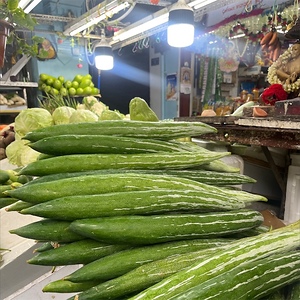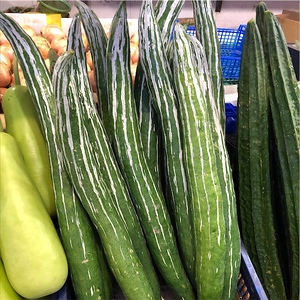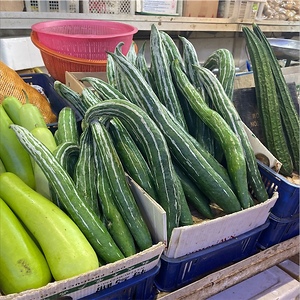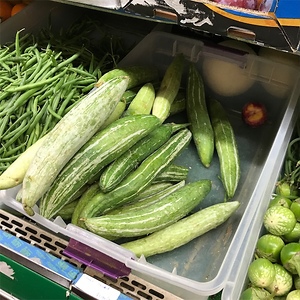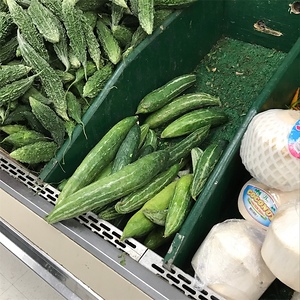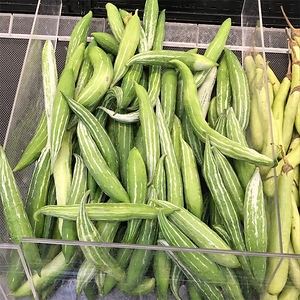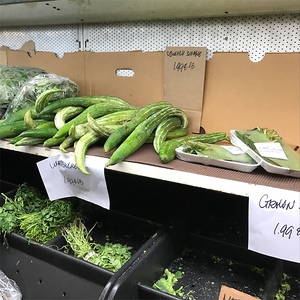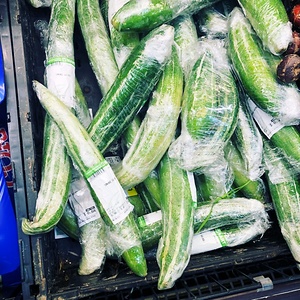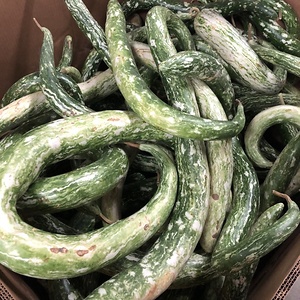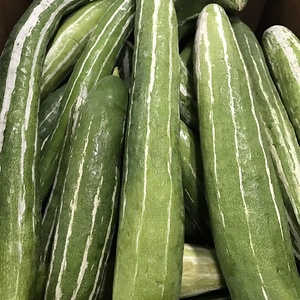


Snake Squash
Estimated Inventory, 10 lbs : 0
Description/Taste
Snake squash is a long, curved vegetable with a thin, green outer skin that features white stripes. Although Snake squash can grow up to 1.8 meters in length, it is best harvested when the fruit is young, at between 30 to 60 centimeters in length. The inner flesh of the Snake squash is white and spongy, much like that of the zucchini. It is relatively bland, and takes on the flavor of the seasonings it is cooked with. Some varieties have a mildly bitter taste, which disappears upon cooking.
Seasons/Availability
Snake squash is available year-round.
Current Facts
Snake squash is botanically classified as Trichosanthes cucumerina, from the Cucurbitaceae family. Throughout the world, the names of "squash" and "gourd" are used interchangeably, and thus the Snake Squash is also commonly referred to as the Snake gourd. Snake squash is a tropical vegetable that thrives in hot temperatures. It grows on a climbing vine. Snake squashes tend to curl as they grow, and must be trellised and weighted at the end of the fruit, in order for them to grow straight. They should be eaten when young, as the older fruit turn very bitter and fibrous when they are mature.
Nutritional Value
Snake squash contains fiber, vitamin A, niacin, thiamine, riboflavin, calcium, potassium and iron.
Applications
Snake squash may be used in curries, dals and soups. It can be used in chutneys and pickles, and can be sautéed. Use Snake squashes in any recipe that calls for zucchini. Store Snake squash in the refrigerator, where it can last for up to 2 weeks.
Ethnic/Cultural Info
Snake squashes have been used in Ayurvedic medicine as a cooling, inflammatory ingredient. Their shoots, leaves and seeds are used throughout Southeast Asia as vegetables and in various traditional medicines. In Italy, the name "Snake squash" in Italy refers to the Cucuzza squash, a variety of Bottle gourd.
Geography/History
Snake squash is a popular vegetable in India and Southeast Asia. It is one of the oldest domesticated crops in India. Snake squash was introduced to Europe by way of China in 1720. Today, Snake squash is also commonly found in tropical and sub-tropical parts of South America and Australia. It is a common home garden crop in Africa, where the pulp of the mature fruit is used as a substitute for tomatoes.
Recipe Ideas
Recipes that include Snake Squash. One
| Aayi's Recipes |
|
Snake Gourd Sidedish (Padwale Randayi) |
| Masala Herb |
|
Snake Gourd Stir Fry |
| Nyonya Cooking |
|
Fried Snake Gourd |
| Blog Explore |
|
Snake Gourd Moong Dal Curry |



